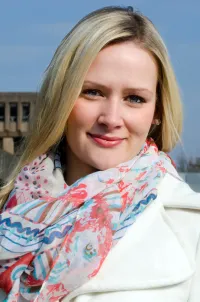
Janina Knappstein is a second-year student of Management. She is pursuing the Master of Science degree. She already holds the Bachelor of Science degree in Management and Economics.
What made you choose this degree programme?
I have been interested in economic issues from a very early age on. Numbers and their significance in particular as well as the economic control of enterprises have always fascinated me. Consequently, studying Management and Economics was the logical choice.
In which respect have or haven’t your expectations been fulfilled?
By studying Management and Economics, I have gained an insight into the individual commercial units that make up an enterprise. Some of the subjects are unfortunately very abstract and lacking in practical relevance so that you have to grit your teeth and struggle through, especially whilst studying the basic principles in your Bachelor’s degree programme. In the subsequent profile-shaping phase and the Master’s degree programme in its entirety, however, it is up to you to compile your own schedule. Thus, you have the chance to specialise in the field that you enjoy most and that contributes to furthering your future career. For me, that “freedom” has been the reason why I chose to study and to remain at the Ruhr-Universität Bochum.
Which aspect of your degree programme do you enjoy most?
I enjoy visiting companies and participating in lectures with actual practitioners best, where I get an insight into the production processes and mechanics of different enterprises. Lectures relating to accounting and finance are likewise very interesting, mainly thanks to the professors who know how to communicate a rather dry subject manner in an entertaining accessible manner and with plenty of practical examples.
What has been your biggest challenge to date?
My biggest challenge so far has been my bachelor thesis. It took a lot of time and effort to write such a thesis, trying to bring in new scientific input. You learn a lot during this time, though, and your commitment gets rewarded in the end.
What would you like to become after completing your degree?
My degree course paves the way for me to work in different corporate segments. I would like to work in the accounting, mergers & acquisitions or controlling departments of a large organisation.
Which advice would you like to give to students who consider enrolling in this degree programme?
Hang in there! A university degree always goes hand in hand with self-reliance: from setting up your own schedule to preparing for exams – you’ve got to organise everything yourself. There is no-one who forces you to do something. You’ve got to want to do it and actually do it.
